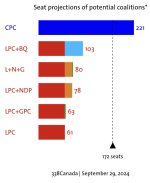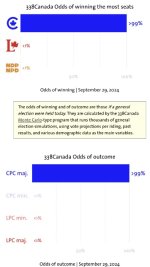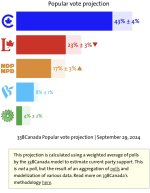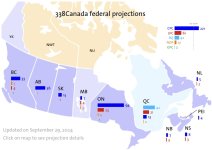Nope we are just using what we have to prop up that line of credit . We , the richest most educated country in the world and we can’t even get close to balancing a budget and spending within our means . We can however afford an official photographer to follow and snap shots of the day in a common man’s life.Canada has nothing left to sell and has been living on a line of credit for the past 30 years or more.
Non-Coalition Coalition that’s Definitely NOT a Coalition…
- Thread starter Ron in Regina
- Start date
You are using an out of date browser. It may not display this or other websites correctly.
You should upgrade or use an alternative browser.
You should upgrade or use an alternative browser.

Not willing to get on the NDP never never plan with respect to “national” (not really national) programs?
Bloc Leader Yves-François Blanchet made the demand on Wednesday, when explaining why he will help Trudeau's government survive a confidence vote later in the day that was advanced by Pierre Poilievre's Conservative party.
Blanchet said his party is trying to "profit, literally" from the situation, after the New Democratic Party pulled out of the parliamentary alliance that had been propping up the Liberal government since March 2022.
Bloc Québécois will try to topple Trudeau government if two bills not passed by Oct. 29 — Toronto Star
The Bloc Québécois is giving Justin Trudeau an ultimatum: If two Bloc bills aren't enacted into law by Oct. 29, the separatist party will try to topple the Liberals' minority government and trigger a federal election.
The Bloc wants the government to help push through two Bloc bills, Blanchet said.
One aims to increase pensions for seniors aged 65 to 74 at a time when expenses far exceeded income, not just for seniors, but for the country has a whole.
The other would protect the supply management system for dairy farmers from getting diluted in future trade negotiations…which pretty much benefits Quebec above all others…& NAFTA or USMYMCA-Whatever has got to be becoming due again soon…
"It's the entire demand in an irrevocable and non-negotiable way," Blanchet said in French, when asked if he would accept only one of those bills becoming law by his deadline.
Blanchet said he chose Oct. 29 since that would leave time to hold an election before the Christmas season, and suggested that his party could try to trigger an election sooner if it becomes clear that the Liberal government isn't helping them try to get their two bills passed according to their timeline.
Between now and Oct. 29…not September 29th like I mistakenly read above… so not in four days. My bad.
One aims to increase pensions for seniors aged 65 to 74 at a time when expenses far exceeded income, not just for seniors, but for the country has a whole.
The other would protect the supply management system for dairy farmers from getting diluted in future trade negotiations…which pretty much benefits Quebec above all others…& NAFTA or USMYMCA-Whatever has got to be becoming due again soon…
"It's the entire demand in an irrevocable and non-negotiable way," Blanchet said in French, when asked if he would accept only one of those bills becoming law by his deadline.
Blanchet said he chose Oct. 29 since that would leave time to hold an election before the Christmas season, and suggested that his party could try to trigger an election sooner if it becomes clear that the Liberal government isn't helping them try to get their two bills passed according to their timeline.
Between now and Oct. 29…not September 29th like I mistakenly read above… so not in four days. My bad.
Nothing unreasonable but why didn't they pitch a bill or ask Poilievre to cooperate for it as an election item?The Bloc wants the government to help push through two Bloc bills, Blanchet said.
One aims to increase pensions for seniors aged 65 to 74 at a time when expenses far exceeded income, not just for seniors, but for the country has a whole.
The other would protect the supply management system for dairy farmers from getting diluted in future trade negotiations…which pretty much benefits Quebec above all others…& NAFTA or USMYMCA-Whatever has got to be becoming due again soon…
"It's the entire demand in an irrevocable and non-negotiable way," Blanchet said in French, when asked if he would accept only one of those bills becoming law by his deadline.
Blanchet said he chose Oct. 29 since that would leave time to hold an election before the Christmas season, and suggested that his party could try to trigger an election sooner if it becomes clear that the Liberal government isn't helping them try to get their two bills passed according to their timeline.
Between now and Oct. 29…not September 29th like I mistakenly read above… so not in four days. My bad.
Maybe that’s next? What they are doing currently is going to play super well in Quebec, and make them stronger seat wise (maybe the official opposition) in the next election.Nothing unreasonable but why didn't they pitch a bill or ask Poilievre to cooperate for it as an election item?
Thats dangerous.Maybe that’s next? What they are doing currently is going to play super well in Quebec, and make them stronger seat wise (maybe the official opposition) in the next election.
He is portraying himself as a war PM lately. Its hard to be an environmentalist that is pro war. Conflicted that boy is.
Unfortunate for western Canada they do not have a card to play in the game.Maybe that’s next? What they are doing currently is going to play super well in Quebec, and make them stronger seat wise (maybe the official opposition) in the next election.
I just hope the next government is fair across-the-board. It’s all we can hope for.Unfortunate for western Canada they do not have a card to play in the game.
Meanwhile…the Liberals didn’t seem to want to engage in a spat with the Bloc.
Quebec lieutenant Jean-Yves Duclos said his government is “not going to be distracted by these political games” in the House of Commons, and they’ll keep Jagmeet in their pocket with his “Ripped Up” or “Torn Up” supply & confidence non-coalition coalition that’s definitely not a coalition-type coalition agreement that the NDP/Liberals & Liberal/NDP’s definitely AREN’T in together…in play until about 60 days before October 20th (or 27th)…so…
…so the NDP/Liberals will support the Liberal/NDP’s Until about the end of August 2025… give or take a day or two.
(From January of 2024, the federal New Democrats believe they will soon be able to pay off their 2021 election debt, but will await end-of-year fundraising totals before marking the occasion. Once that's done, she said the party will start building a war chest for the next federal election call, which has to come sometime before Oct. 20, 2025)

 www.nationalobserver.com
Anywho, back to the Bloc Québécois: Bill C-319 seeks to increase pensions for seniors aged 65 to 74 by 10 per cent. The independent Parliamentary Budget Officer estimates the proposal could cost $16 billion over five years, so annually it amounts to the fallout of about two Liberal scandals per year.
www.nationalobserver.com
Anywho, back to the Bloc Québécois: Bill C-319 seeks to increase pensions for seniors aged 65 to 74 by 10 per cent. The independent Parliamentary Budget Officer estimates the proposal could cost $16 billion over five years, so annually it amounts to the fallout of about two Liberal scandals per year.
Bill C-282, intended to prevent federal governments in the future from negotiating adjustments to Canada’s dairy and poultry supply-management quota system in trade deals, has already passed the House and is awaiting review in the Senate, & USMCA isn’t due again until 2036 unless something goes south (figuratively, and literally).
International Trade Minister Mary Ng said that the Liberal government has already supported the Bloc’s bill on supply management.
“We’ve been very clear that Canada’s supply managed sector is really, really important (for all the provinces that start with the letter “Q”) and so that bill that has gone forward already,” she said.
Finance Minister Chrystia Freeland said this week she was having “conversations” with the Bloc on the issue, the poor bastards, being forced to listen to that.

 apple.news
apple.news
Quebec lieutenant Jean-Yves Duclos said his government is “not going to be distracted by these political games” in the House of Commons, and they’ll keep Jagmeet in their pocket with his “Ripped Up” or “Torn Up” supply & confidence non-coalition coalition that’s definitely not a coalition-type coalition agreement that the NDP/Liberals & Liberal/NDP’s definitely AREN’T in together…in play until about 60 days before October 20th (or 27th)…so…
…so the NDP/Liberals will support the Liberal/NDP’s Until about the end of August 2025… give or take a day or two.
(From January of 2024, the federal New Democrats believe they will soon be able to pay off their 2021 election debt, but will await end-of-year fundraising totals before marking the occasion. Once that's done, she said the party will start building a war chest for the next federal election call, which has to come sometime before Oct. 20, 2025)

Federal NDP will soon be debt free and ready to build up war chest
The party has less than $1 million left on a $22-million election loan from 2021, and recent fundraising efforts should allow it to pay off the debt in the coming months, said NDP director Anne McGrath.
Bill C-282, intended to prevent federal governments in the future from negotiating adjustments to Canada’s dairy and poultry supply-management quota system in trade deals, has already passed the House and is awaiting review in the Senate, & USMCA isn’t due again until 2036 unless something goes south (figuratively, and literally).
International Trade Minister Mary Ng said that the Liberal government has already supported the Bloc’s bill on supply management.
“We’ve been very clear that Canada’s supply managed sector is really, really important (for all the provinces that start with the letter “Q”) and so that bill that has gone forward already,” she said.
Finance Minister Chrystia Freeland said this week she was having “conversations” with the Bloc on the issue, the poor bastards, being forced to listen to that.
Bloc levels ultimatum at Liberals, threatens vote to bring down government — National Post
Liberal support for Bloc Québécois private member's bills on increasing support for seniors and protecting supply management is 'non-negotiable,' leader Blanchet says
hahahaha!!!I just hope the next government is fair across-the-board. It’s all we can hope for.
Yep. The NDP has suggested its support for the Liberals will last as long as it takes to get the pharmacare bill to provide free contraceptives and diabetes drugs and devices through the Senate and into law (no matter what), and to expand eligibility for dental care beyond children and seniors.hahahaha!!!
{The Parliamentary Budget Officer (PBO) estimated the cost of pharmacare at about $1.9 billion over five years, assuming provincial and private plans continue covering medications under their current terms}
You know it’ll take until at least the end of August of 2025 by design too. By then Jagmeet will have his pension & a loan in place to try & get the NDP through another federal election.
It took 5 years to run a disability bill through. Payments have been accumulating since June and wont ne paid out until June 2025. So no, Darkmeet wont get that through before Oct 2025.Yep. The NDP has suggested its support for the Liberals will last as long as it takes to get the pharmacare bill to provide free contraceptives and diabetes drugs and devices through the Senate and into law (no matter what), and to expand eligibility for dental care beyond children and seniors.
{The Parliamentary Budget Officer (PBO) estimated the cost of pharmacare at about $1.9 billion over five years, assuming provincial and private plans continue covering medications under their current terms}
You know it’ll take until at least the end of August of 2025 by design too. By then Jagmeet will have his pension & a loan in place to try & get the NDP through another federal election.
On that note, with the Bloc’s demand regarding bulletproofing supply management for chickens, milk, cheese, etc…from negotiations completely, would leave all the bend and flex on things that aren’t covered by supply management like pork, beef, canola, etc…so…pretty much a “Screw the West at the expense of Quebec” again type of thing, which will play very well in Quebec for Quebec.
The Bloc Québécois isn’t overly concerned Federally with the Conservatives gaining any real traction or advantage in Quebec, as its political rivals really are just the Liberals for all intents and purposes. This move would hamstring the Liberal Party and force them into the hinder lands in Quebec politics for the foreseeable future, and the Liberals are fully away of this.
The Bloc Québécois says it is “very concerned” that one of the two bills it is prioritizing to keep the Trudeau government in power is stuck in the Senate.
Earlier this week, many senators appeared reluctant to support Bill C-282, which would automatically exclude supply management from any international trade agreement Canada enters.
The Bloc’s agriculture, agri-food and supply management critic, Yves Perron, said Friday that while the bill appears to be moving forward, concerns remain.
“We are very concerned that a study on Africa will continue and lead to a delay in the study of C-282, especially since some senators have already expressed hostility toward our bill,” Perron said in a statement.
“Hostility” erupted Wednesday afternoon, as senators questioned Perron and two Bloc colleagues at the Standing Senate Committee on Foreign Affairs and International Trade.
Many senators expressed concern about the bill’s “narrow scope.”
“By rigidly protecting supply management, we risk alienating export-dependent regions like ours that depend on the free market and trade agreements,” suggested Sen. Mohamed-Iqbal Ravalia, an independent senator from Newfoundland and Labrador.
The Bill has been criticized by the Canadian Agri-Food Trade Alliance who argues that C-282 “will hurt the 90 per cent of farmers who depend on trade.” According to the alliance, Agri-food exporters exported $92.8 billion in agri-food products in 2022 and supported over a million jobs in urban and rural communities across Canada.

 apple.news
“Setting a protectionist precedent undermines Canada’s leadership and work at international forum like the WTO,” argues the alliance, who also said this Bill “prioritizes the economic interests one sector above the economic interests of any other sector in Canada.”
apple.news
“Setting a protectionist precedent undermines Canada’s leadership and work at international forum like the WTO,” argues the alliance, who also said this Bill “prioritizes the economic interests one sector above the economic interests of any other sector in Canada.”
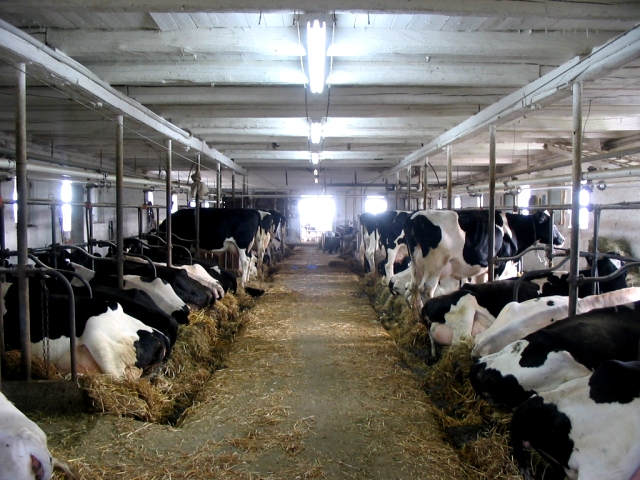
 en.wikipedia.org
Proponents of the framework tend to claim that it is designed to ensure that these farms can be profitable and Canadian consumers have access to a "high-quality, secure" supply of what they claim to be "sensitive products" at stable prices without shortages and surpluses.
en.wikipedia.org
Proponents of the framework tend to claim that it is designed to ensure that these farms can be profitable and Canadian consumers have access to a "high-quality, secure" supply of what they claim to be "sensitive products" at stable prices without shortages and surpluses.
Opponents of the system tend to view it as an attempt by members of the supply managed industries to form a publicly supported "cartel" and profit at the expense of purchasers.
The Organisation for Economic Co-operation and Development (OECD) maintained in 2017 that Canada's "export growth would be boosted if Canada phased out its Canadian dairy supply management policies".
Supply management was one of many issues in Comprehensive Economic and Trade Agreement (CETA), a free-trade agreement between Canada, the European Union and its member states and Comprehensive and Progressive Agreement for Trans-Pacific Partnership (CPTPP) negotiations and the United States Mexico Canada Agreement(USMCA).
Coincidentally, the two provinces in Canada that are by far the largest poultry and dairy producers are not in the Maritimes or west of Ontario or north of 54/40. Following the Bloc Québécois demand will mean any and all economic negotiated concessions in trade in the agricultural sector will come from pretty much everywhere except the same two provinces. The fact that Ontario might benefit from this is a irrelevant to Quebec.
The Bloc Québécois isn’t overly concerned Federally with the Conservatives gaining any real traction or advantage in Quebec, as its political rivals really are just the Liberals for all intents and purposes. This move would hamstring the Liberal Party and force them into the hinder lands in Quebec politics for the foreseeable future, and the Liberals are fully away of this.
The Bloc Québécois says it is “very concerned” that one of the two bills it is prioritizing to keep the Trudeau government in power is stuck in the Senate.
Earlier this week, many senators appeared reluctant to support Bill C-282, which would automatically exclude supply management from any international trade agreement Canada enters.
The Bloc’s agriculture, agri-food and supply management critic, Yves Perron, said Friday that while the bill appears to be moving forward, concerns remain.
“We are very concerned that a study on Africa will continue and lead to a delay in the study of C-282, especially since some senators have already expressed hostility toward our bill,” Perron said in a statement.
“Hostility” erupted Wednesday afternoon, as senators questioned Perron and two Bloc colleagues at the Standing Senate Committee on Foreign Affairs and International Trade.
Many senators expressed concern about the bill’s “narrow scope.”
“By rigidly protecting supply management, we risk alienating export-dependent regions like ours that depend on the free market and trade agreements,” suggested Sen. Mohamed-Iqbal Ravalia, an independent senator from Newfoundland and Labrador.
The Bill has been criticized by the Canadian Agri-Food Trade Alliance who argues that C-282 “will hurt the 90 per cent of farmers who depend on trade.” According to the alliance, Agri-food exporters exported $92.8 billion in agri-food products in 2022 and supported over a million jobs in urban and rural communities across Canada.
Bloc faces 'hostility' in Senate over supply management bill — National Post
The party says it is 'very concerned' that one of its bills is stuck in the upper chamber

Dairy and poultry supply management in Canada - Wikipedia
Opponents of the system tend to view it as an attempt by members of the supply managed industries to form a publicly supported "cartel" and profit at the expense of purchasers.
The Organisation for Economic Co-operation and Development (OECD) maintained in 2017 that Canada's "export growth would be boosted if Canada phased out its Canadian dairy supply management policies".
Supply management was one of many issues in Comprehensive Economic and Trade Agreement (CETA), a free-trade agreement between Canada, the European Union and its member states and Comprehensive and Progressive Agreement for Trans-Pacific Partnership (CPTPP) negotiations and the United States Mexico Canada Agreement(USMCA).
Coincidentally, the two provinces in Canada that are by far the largest poultry and dairy producers are not in the Maritimes or west of Ontario or north of 54/40. Following the Bloc Québécois demand will mean any and all economic negotiated concessions in trade in the agricultural sector will come from pretty much everywhere except the same two provinces. The fact that Ontario might benefit from this is a irrelevant to Quebec.
After everything Canada has given away we sure get concerned when the cheese industry is involved.
Ah, take my love, take it down….And on that note, we’re probably not gonna be looking at a election being called this next week…
View attachment 25048
View attachment 25049
View attachment 25050
The Conservatives are still less than 50% of the popular vote.
View attachment 25051
Oh, climb a mountain and turn around
And if you see my reflection in the snow covered hills
Well, the landslide will bring it down
And if you see my reflection in the snow covered hills
Well, the landslide will bring it down
Oh, the landslide will bring it down
FIRST READING: Why isn't the NDP triggering an election? They can't afford one — National Post
The party is so broke they'd struggle just to cover the travel expenses of the leader
Paywalled but the title is anyone needs.
FIRST READING: Why isn't the NDP triggering an election? They can't afford one — National Post
The party is so broke they'd struggle just to cover the travel expenses of the leaderapple.news


